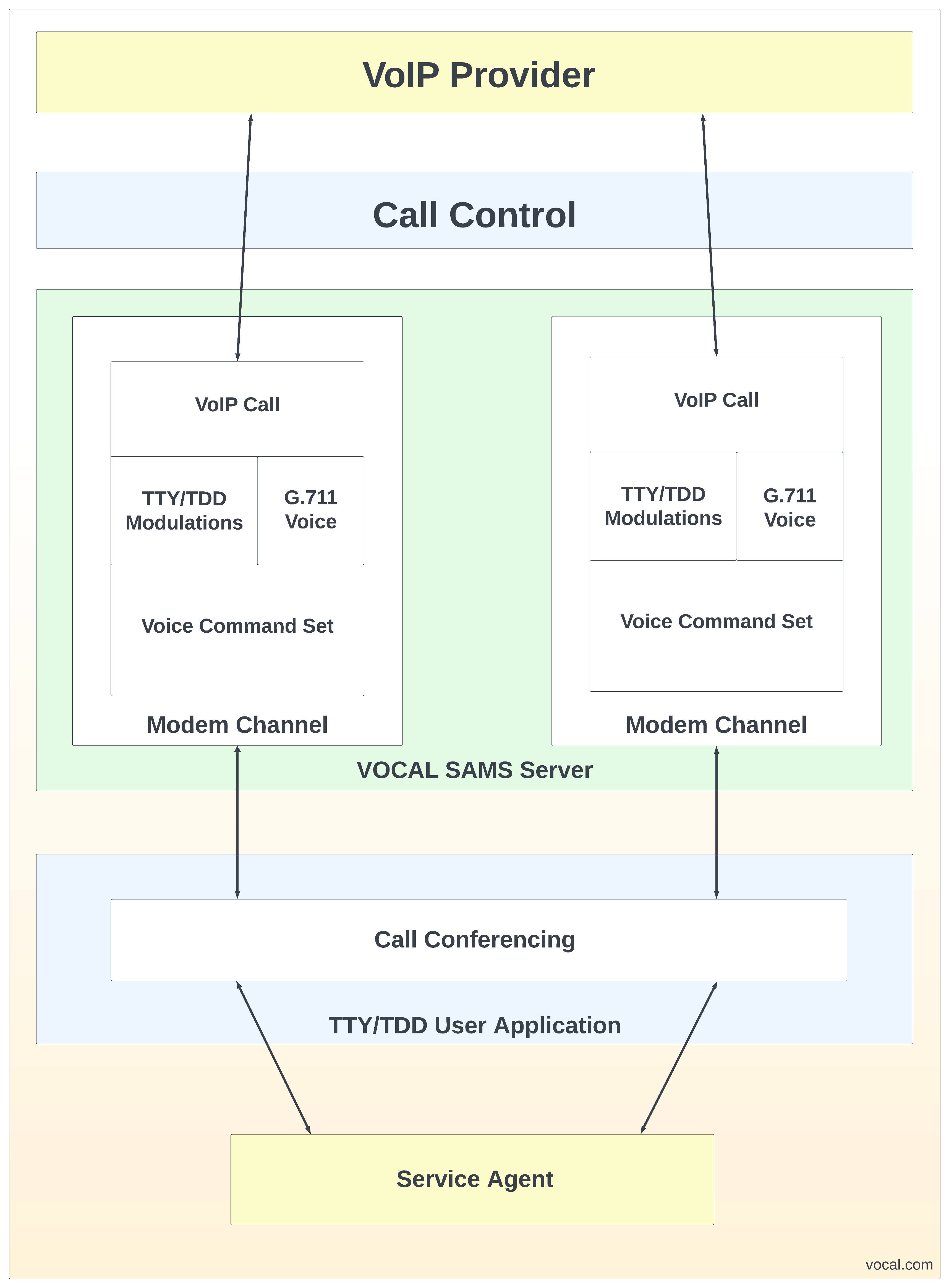 VOCAL uses Voice over IP (VoIP) to implement an SIP Analog Modem Server (SAMS) for Teletype (TTY) / Telecommunications Device for the Deaf (TDD) that interoperates with legacy modems without the need for modem banks with E1/T1 connections.
VOCAL uses Voice over IP (VoIP) to implement an SIP Analog Modem Server (SAMS) for Teletype (TTY) / Telecommunications Device for the Deaf (TDD) that interoperates with legacy modems without the need for modem banks with E1/T1 connections.
As E1/T1 lines are increasingly being replaced by Ethernet based VoIP systems, companies are often left with modem based technology that can no longer work with the new infrastructure, but remain necessary for daily business. This can happen with servers interacting with TTY/TDD text telephones, point of sale devices, meters, alarm systems and numerous industrial controllers, VOCAL has a number of solutions to solve these problems.
Can TTY/TDD be supported by VoIP?
VOCAL’s Virtual Modem Server allows a business to deploy a server in the cloud, which can work with the modern VoIP phone network infrastructure, based on SIP and RTP, instead of necessitating T1/E1 lines to connect to the PSTN. The Virtual Modem server contains true soft-modems, not just an AT command set on a TCP socket, pretending to be a modem. This allows the server to connect to true voice band modems deployed on the PSTN, and thus does not require installation of additional equipment on the far end of the system. The server is controlled by industry standard AT commands via standard tty nodes in the server’s filesystem – just as if it were a box-modem on a serial connection. This allows it to easily fit into currently existing systems.
Many other configurations and methods of control are available in order to flexibly meet the needs of already deployed infrastructure and applications. In addition, VOCAL can customize or build to suit, in order to meet very specific system requirements.
Can SAMS support text and voice?
TTY/TTD applications utilize the Baudot modulation mode that is not supported by standard box modems. As a result, providers of TTY/TDD services have been utilizing specialized equipment to communicate with analog text phones. Most of this equipment is now failing after years of usage and the devices have become end-of-life and their manufacturers have disappeared. This has left companies with no choice but to continue maintaining old expensive equipment. VOCAL’s SAMS provides a path towards modernizing as it provides support for both Baudot and ASCII TTY/TDD modulation modes.
TTY/TDD providers also find themselves in the position of requiring both text and voice capabilities from their telecommunications setup. Traditionally, this meant relying on multiple technologies to handle different phases of a call – switching between a data modem and voice termination as required. VOCAL’s SAMS server supports the V.253 voice command set which enables transmission of G.711 voice data over a DTE connection and allows the handling of both text and voice capabilities from a single endpoint.
The Software is part of a fully integrated and highly configurable VoIP software solution with a Network Stack, SIP Stack, secure communications, full-featured Telephony software, and a comprehensive data modulation and data modem software library. Our software is available for licensing as a library or a complete design with custom solutions available.
Features
- 100% software solution – easily migrates to the cloud
- Runs on any standard Windows or Linux distribution
- Scalable – enables a large number of modems on a single server (10s to 100s depending on the server and modem rates)
- Exports tty (com port) interface for each modem
- Industry standard AT commands – – V.250, Industry Standard
- Supports Voice mode operations – – V.253, Voice Command Set
- Registers with one or more SIP servers (can be phone number per line, modem pool hunt, or other combinations)
- SRTP and Secure SIP options available
- Dialing commands will make outgoing SIP/G.711 call (with modulation data in the stream)
- Incoming SIP calls will report RING to applications listening to ttys
- Compatible with ppp and pppd etc.
- Requires no analog audio interface
- Slaves to far end modem clock to eliminate skew
- High speed data modulation – V.34, V.90, V.92 (optional)
- Low speed data modulation – V32., V.32bis, V.22, V.22bis, V.23, V.21
- TTY/TDD modulations – Baudot and ASCII modes
- Bell modulation – Bell 212, Bell 103
- Supports standard protocols such as V.42 / LAPM, MNP 2-4
- Supports standard compression protocols such as V.42bis and MNP5
VOCAL’s solution is available for the above platforms. Please contact us for specific supported platforms.
More Information